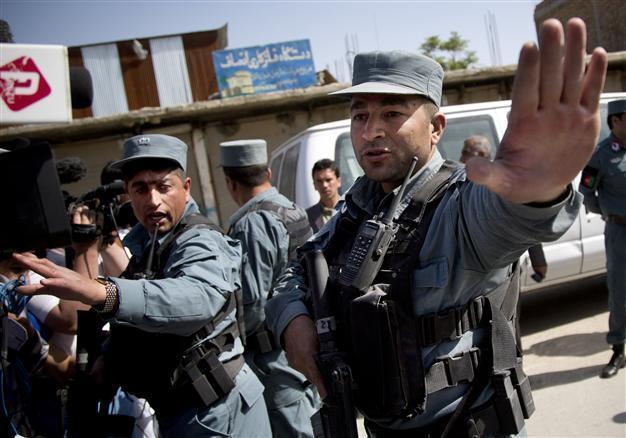Gunmen occupy Kabul building in Taliban attack
KABUL - Agence France-Presse

File photo shows Afghan policemen stopping people from approaching the scene where a suicide car bomber attacked a NATO convoy in Kabul. AP Photo
Explosions and gunfire rocked central Kabul Friday as the Taliban launched an attack close to an Afghan intelligence facility and the headquarters of a government force that protects foreign firms.
The attack comes a week after a suicide car bomb targeting a foreign military convoy killed 15 people including five Americans in the deadliest attack in the Afghan capital for nearly a year.
The Taliban announced their annual "spring offensive" on April 27, opening a crucial period as local security forces take the lead in the fight against the insurgents.
At least two blasts hit the centre of Kabul at about 4:00 pm (1130 GMT) on Friday, the second day of the Afghan weekend, and gunfire erupted as security forces rushed to the scene.
Kabul police spokesman Hashmat Stanikzai told AFP the initial blast came close to a hospital run by the NDS intelligence agency and the headquarters of the Afghan Public Protection Force (APPF), a government force that provides security for clients including international firms, supply convoys and aid groups.
He said gunmen had occupied a building in the attack, which is ongoing.
Jawed Kazem, a local shopkeeper, said: "I was sitting in my shop when the explosion happened. It was a big explosion which threw me off my chair, minutes later another explosion happened.
"Smoke is rising and gunfire is continuing." Taliban spokesman Zabiullah Mujahid told AFP that his group was responsible and added that the attack began with a suicide car bombing.
"A group of other mujahideen armed with heavy and light weapons then took position in a building and are firing on several targets including a building in which the foreigners and members of spy agency stay," he said.
The suicide bombing last Thursday was the first major attack in Kabul since March 9 when a bomber on a bicycle killed nine people outside the defence ministry during a visit by US Defense Secretary Chuck Hagel.
The attacks further underline the capital's vulnerability to militant assaults as 100,000 NATO troops gradually withdraw from Afghanistan ahead of the end of international combat operations next year.
Local forces are increasingly coming under attack from the Taliban as they take over from foreign forces, who will pull out of Afghanistan by the end of next year.
Six members of the APPF were killed on Tuesday in a roadside bombing in western Afghanistan as they travelled to a hydroelectric dam that is under protection from insurgent attack.
More than 11 years after the Taliban regime was ousted in 2001, efforts to seek a political settlement ending the violence have so far made little progress, but pressure is growing ahead of the NATO withdrawal.
